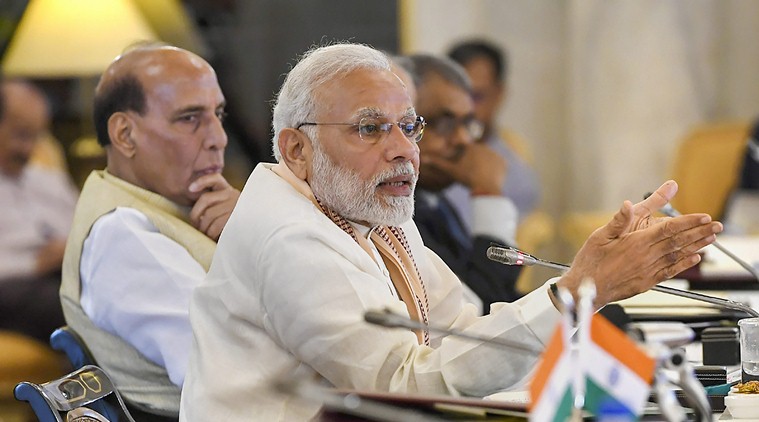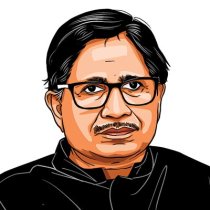Polls Are Best Kept Apart
Simultaneous elections will go against Constitution’s basic structure.

Prime Minister Narendra Modi. File Photo
Written by Shantram Naik. He was Rajya Sabha MP and former Chairman of the Department of Personnel, Public Grievances Law and Justice, died on June 9. He sent this article a few days earlier.
Prime Minister Narendra Modi contends that he has mooted the idea of holding simultaneous polls in the country. The step may appear to be purely reformist but in reality, it’s an unconstitutional measure and should not be pushed down the throats of people.
In his address to the joint session of Parliament at the beginning of the last budget session, President Ram Nath Kovind said,”Frequent elections not only impose a burden on human resources but also impede the development process due to the promulgation of Model Code of Conduct. Therefore, a sustained debate is required on the subject of simultaneous elections and all political parties need to arrive at a consensus this issue.” There is a misconception that an amendment to the Representation of Peoples’s Act 1951 is all that is needed for holding simultaneous polls to the Lok Sabha and the state assemblies.
But why has the Union Law Ministry not prepared a draft constitutional amendment and put it up for public comments? If the ministry were to attempt such an endeavour, it will realise the hollowness of the concept. Discussions with the public, political parties and all other stakeholders would have to be reflected in the bill. The most sensitive aspect of the matter, however, is that holding a simultaneous election to the Lok Sabha and state assemblies will require making changes to the Constitution’s basic structure.
According to the Supreme Court, matters germane to the basic structure include: Provisions dealing with supremacy of the Constitution, the rule of law, the principle of separation of powers, judicial review, Articles 32 and 226, federalism including the liberty of states under Articles 282 and 293, secularism, the sovereign, democratic and republican structure of the Constitution, freedom and dignity of the individual, unity and integrity of the nation, the principle of equality, the essence of other fundamental rights in Part III, the concepts of social and economic justice, the commitment to build a welfare state, the balance between fundamental rights and directive principles, the parliamentary system of government, the principle of free and fair elections, limitations upon amending the power conferred by Article 368, independence of the judiciary, effective access to justice, powers of the Supreme Court under Articles 32, 136, 141 and 142, legislation seeking to nullify the awards made in exercise of the judicial power of the state by arbitration tribunals constituted under an Act.
Apart from the basic structure, the federal structure of the polity — itself a part of the basic structure — will collapse like a pack of cards if an amendment to the Representation of People’s Act is approved by Parliament.
Will the Supreme Court permit a review of the Constitution’s basic structure? After all, the apex court has been reluctant to meddle with the Constitution’s basic structure. How will the Centre overcome the stiff resistance from several political parties? Moreover, will the NDA governments in the states agree to curtail their terms? Will the Election Commission agree to undertake the huge exercise when the agency cannot hold elections in even three states without dividing the process into as many as seven phases?
Will the Supreme Court permit a review of the Constitution’s basic structure? After all, the apex court has been reluctant to meddle with the Constitution’s basic structure. How will the Centre overcome the stiff resistance from several political parties? Moreover, will the NDA governments in the states agree to curtail their terms? Will the Election Commission agree to undertake the huge exercise when the agency cannot hold elections in even three states without dividing the process into as many as seven phases?
A report of the Standing Committee of Parliament, headed by E M S Nachiappan pointed out: “Holding simultaneous elections may not be feasible in 2016 or even in a decade.” The committee, however, expressed confidence that a solution will be found to reduce the frequency of elections and relieve the people and government machinery from tedium of frequent polls. This is important for India if it is to compete with other nations in its developmental agenda. However, this committee did not touch issues pertaining to the basic structure of the Constitution.
For all the latest Opinion News, download Indian Express App







































No hay comentarios:
Publicar un comentario